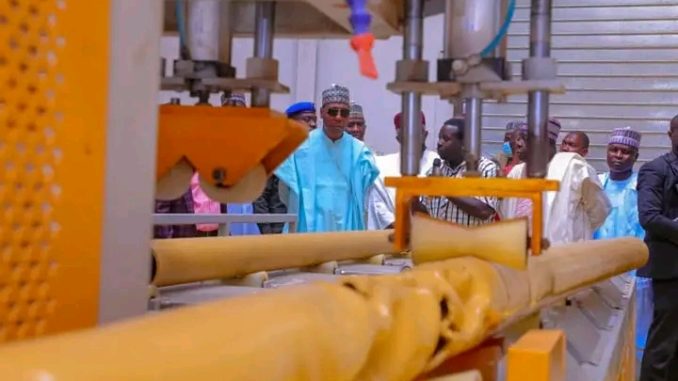
Borno State is known for its rich cultural heritage and history, but it is also home to several untapped industrial potentials. The industrial hub constructed by the Borno State government during the last administration is a vital initiative that not only serves as a revenue-generating point but also addresses the ongoing unemployment challenges in the state.
This industrial hub, located at Njimtilo along Maiduguri- Kano road, is a key component of the post-insurgency plan put in place by the government to tackle the pressing issue of high unemployment in the region.
The fact that the industrial hub integrates various sectors such as renewable energy, furniture-making, and agriculture makes it a multifaceted project that has the potential to revolutionize the economic landscape of Borno State.
One of the standout features of the industrial hub is the Solar Panel Plant, which is set to produce around 40 megawatts of electricity for the factories within the layout. This not only ensures a reliable and sustainable source of power but also contributes towards reducing the state’s dependence on non-renewable energy sources.
By investing in renewable energy infrastructure, the government is not only fostering economic growth but also demonstrating its commitment to sustainable development practices.
Furthermore, the proposal then for a furniture-making firm to be situated within the industrial hub is a strategic move that will create jobs and boost the local economy. The furniture industry is known for its potential to generate substantial revenue and provide employment opportunities for skilled and unskilled workers alike.
By establishing a furniture-making firm within the hub, the government is tapping into a lucrative market that has the potential to thrive in the state.
In addition to the furniture-making firm, the government has also planned for a Corn Chip Plantation to be located at the layout. This agricultural venture is an excellent example of how the industrial hub is diversifying its activities to encompass different sectors of the economy. The production of high-quality corn chips not only opens up export opportunities but also creates a demand for locally sourced ingredients, thereby benefiting local farmers and suppliers.
Currently, a high breed tomato is being produced in the field, which is a testament to the agricultural potential of the region. By focusing on high-value crops and embracing modern farming techniques, the industrial hub is not only increasing agricultural productivity but also fostering innovation within the sector.
Moreover, the employment opportunities created through agricultural activities are crucial for providing jobs to the rural population and reducing rural-urban migration.
In addition to the above, there exist functional plastic company, the BOPLAST, holds promise for producing essential household items such as plastic chairs, water tanks, and nylon. However, in order to fully realize its potential, the company requires raw materials to kickstart production.
In addition to BOPLAST, other industries like the Neital shoe factory, the Enamel wire industry, and the Maiduguri flour mills lie dormant, waiting to be revitalized. These industries have the capability to create jobs, stimulate economic growth, and provide essential goods to the people of Borno State.
One particularly promising hub that has been abandoned since the 1960s is the Maiduguri Abattoir. This industry boasts of machinery for meat processing, canning, and animal feed processing. If brought back to life, the Maiduguri Abattoir has the potential to not only meet the meat processing needs of the state but also create a ripple effect of economic opportunities for local farmers, suppliers, and workers.
Reviving these industries and activating their full potentials could transform Borno State into an industrial hub. With strategic investments, sound management, and government support, these industries can contribute to job creation, poverty alleviation, and overall economic prosperity for the state.
